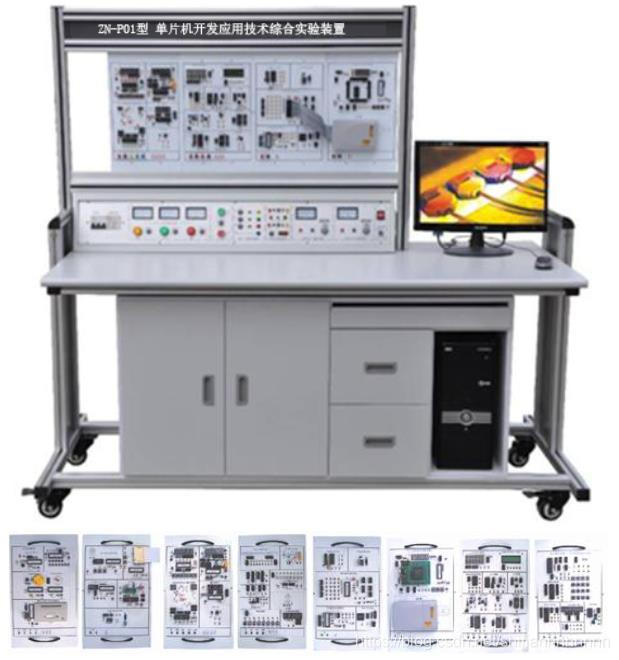ZN-P01 type single-chip microcomputer development and application technology comprehensive experimental device
1. Overview
ZN-P01 type single-chip microcomputer development and application technology comprehensive experimental device is composed of a control panel, an experimental hanging box, and an experimental table. Through this experimental platform, the interface expansion and data acquisition of the single-chip microcomputer can be completed. , Data display, keyboard control, timer, printer interface and other experiments, equipped with an emulator.
Equipped with a current-type leakage protector, if there is leakage in the control panel, and the leakage current exceeds a certain value, the power supply will be cut off, which will protect personal safety to a certain extent.
The ZN-P01 single-chip microcomputer development and application technology comprehensive experimental device adopts a modular structure, and it is convenient to replace the experimental module. If you need to expand the function or develop a new experiment, you only need to add the experiment module hanging box, and it will never be eliminated.

2. Main technical parameters
1. Input power supply: AC220V±10% 50Hz
2. Working environment: temperature -10°C~+40°C relative humidity <85% (25°C)
3. Device capacity: 200VA
4. Weight: 100Kg
5. Dimensions (cm): 160×75×150
6. Hanging box size (mm): 410×240×60
7. Output power: with leakage, short circuit, and overcurrent protection
A. ~220V, output through a safety socket
B. DC stabilized power supply: ±5V/1A ±12V/2A
3. Device composition
(1) Experimental screen: Place the experimental hanging box during the experiment, and provide the experimental power, iron double-sided matte dense grain spray structure.
(2) Experimental table: steel-wood structure, the tabletop is made of fireproof, waterproof, wear-resistant high-density board, and the computer table has a one-piece design with a beautiful appearance.
(3) Experimental modules:
1. DP-01 single-chip microcomputer experiment hanging box (1)
LED dot matrix display module, dot matrix character LCD display module, 8253 timing counter, A/D conversion, D/A conversion, V/F conversion, F/V conversion, serial EEPROM, EEPROM, Flash Rom, SRAM, I2C Bus interface
2, DP-02 single-chip microcomputer experiment hanging box (2)
8251 serial port expansion, 232 bus serial interface, single-chip micro-application system 1, single-chip micro-application system 2, pull code switch output
3, DP-03 single-chip experimental hanging Box (3)
ISD 1420 voice control, IC card reading and writing interface, real-time hour hand/calendar, USB interface, RS232 to RS485 interface
4, DP-04 single-chip experiment hanging box (4)
8279 interface circuit, 8255 I/O extension, 8155 I/O expansion, dynamic scanning display module, conversion interface, MC14433, whole-column keyboard experiment module
5, DP-05 single-chip experiment hanging box (5)
stepper motor driver display, temperature sensor and temperature control, car turning signal lamp/ Crossroad traffic lights, digital frequency meter, watchdog
6, DP-06 single-chip experiment hanging box (6)
16-bit logic level display, relay control interface, common device interface, 8-bit logic level output, single pulse , Speaker, string static display module, query keyboard.
7. DP-07 single-chip experiment hanging box (seven)
main function logic pen, multi-function password lock, DC motor drive, stepping motor drive, micro-printer and single-chip microcomputer interface
8. DP-08 single-chip experimental hanging box (eight)
single-chip microcomputer With CPLD experiment, sh51 simulator
4. Basic experiment content
1. Clear the memory block
2. Binary to BCD code conversion
3. 3. Binary to ASCII code conversion
4. Program jump table
5. Memory block movement
6. Data sorting
7. P1 port input and output experiment
8. Relay control experiment
9. Use 74LS244 to read in data10
. Use 74LS273 to output data
11. Serial data conversion parallel data
12. Parallel data conversion to serial data
13. PWM conversion voltage experiment
14. Audio control experiment
15.8255 input, output experiment
16.8155 input, output experiment
17.5 LED static serial display experiment
18.6 LED dynamic scanning display experiment
19. Query keyboard experiment
20. Array keyboard experiment
21. Counter experiment
22. Timer experiment
23.8253 Timer experiment
24. External interruption experiment
25. Serial port communication experiment
26. ADC0809 analog-to-digital conversion experiment
27. DAC0832 digital-to-analog conversion experiment
28. MC14433 analog-to-digital conversion experiment
29. EEPROM external data program memory experiment
30. SRAM external data memory expansion experiment
31. 93C46 serial EEPROM data reading and writing experiment
32. Electronic clock experiment
33. Electronic keyboard simulation experiment
34. Printer control experiment
35. Car turning signal light control experiment
36. Temperature sensor temperature control experiment
37. Temperature process control simulation experiment
38. Five-phase stepping motor simulation experiment
39. Calculator experiment
40. Digital frequency meter experiment
41. V/F conversion experiment
42. F/V conversion experiment
43. LED dot matrix display experiment
44. Character LCD screen control experiment
45.8279 keyboard scan display experiment
46. Watchdog experiment
47.8251 serial port expansion communication experiment
48. I2C bus read and write experiment
49. RS232 to RS485 experiment
50. USB interface experiment
51. Crossroad traffic light control experiment
52. Five-function logic pen experiment
53. DC motor drive speed regulation experiment (in kind)
54. Stepping motor drive experiment (in kind)
55. IC card reading and writing experiment
56. Real-time clock/calendar control experiment
57. Voice chip control experiment
58. One-chip computer and CPLD experiment
59. 8051 and PC serial port communication experiment
60. Flash Rom external program memory experiment
61. Multifunctional password lock experiment
Comprehensive experimental device for development and application of single-chip microcomputer
Guess you like
Origin blog.csdn.net/shijiannnnnnnn/article/details/114111028
Recommended
Ranking